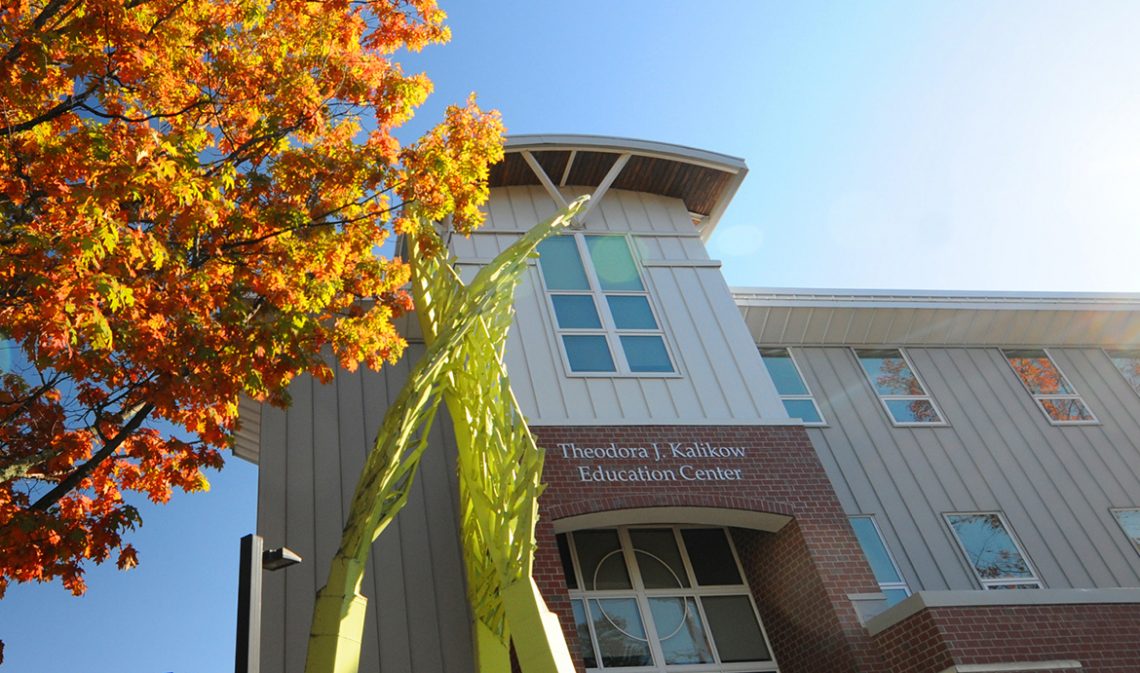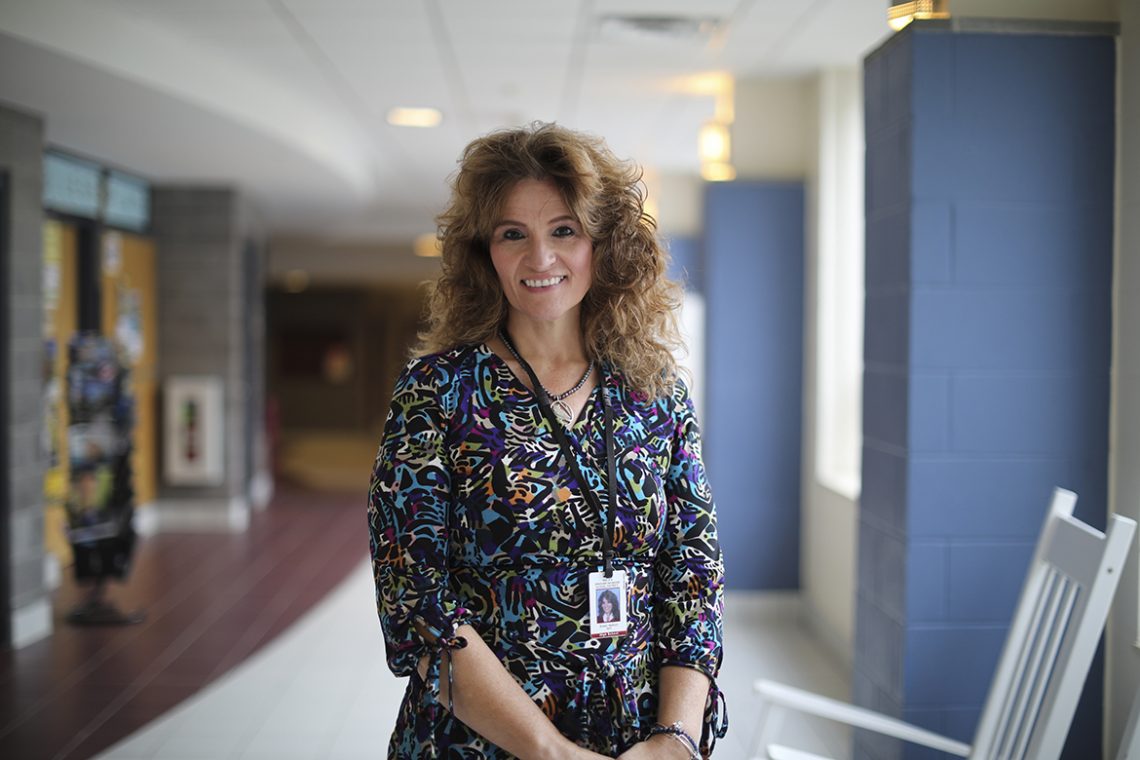The new program’s distinct admission pathways for traditional and nontraditional students and blended-delivery model of instruction will help meet Maine’s critical shortage of certified special education teachers.
By Marc Glass, October 2019
The University of Maine at Farmington, Maine’s first public institution of teacher education, is now accepting applications for admission to its new Master of Science in Special Education degree program. With a focus on inclusive special education, distinct pathways for traditional and nontraditional students, and no GRE test scores required for admission, UMF’s new 33-credit master’s in special education program will provide people with advanced skills and knowledge required to meet Maine’s critical shortage of certified special education teachers.

The University’s new M.S.Ed. in Special Education program features a blended-delivery model of instruction, with 70 percent of classes offered online and the balance offered within the Theodora J. Kalikow Education Center on the UMF campus. (Photo by Bob Bailie.)
“Offering this new master’s degree is an exciting chapter in UMF’s nearly 60-year-history of excellence in special education teacher preparation,” says Dr. Edward Serna, president of the University of Maine at Farmington. “Our faculty are excited to bring their own classroom experiences and expertise to future generations of students seeking an advanced degree in the field. The need for certified special education teachers has never been greater, and I’m proud that UMF and its faculty will play a leadership role in meeting this workforce need.”
For undergraduate students enrolled in UMF’s bachelor’s in special education program or pursuing a 20-credit minor in special education at UMF, the University will offer a “4+1” accelerated path to a bachelor’s and a master’s degree in special education — in five years rather than six. Available only to undergraduate UMF students, the expedited “4+1” pathway will be available to UMF undergraduate students beginning in spring 2020.
Through the “4+1” pathway, UMF undergraduate students can complete up to 12 credits of graduate course work before completing their bachelor’s degree. 4+1 students taking graduate courses will pay UMF’s lower undergraduate rate for the graduate credits — and those graduate credits count toward earning both the bachelor’s and master’s degrees, saving in-state UMF students as much as $5,000 in tuition.
Nathan Poulin, a sophomore special education major from Williamstown, Vt., says the “4+1” option will allow him the opportunity to earn a master’s degree with UMF professors who are already providing strong mentoring and professional development.

Starting in spring 2020, Nathan Poulin ’22 and his fellow special education majors at UMF will be able to pursue a “4+1” accelerated path to a master’s in special education with faculty who have been their undergraduate mentors. (Photo by Marc Glass.)
“As a result of their own work with students with disabilities, all of my special education professors bring a great deal of real-world experience to the classroom at UMF,” says Poulin. “For every lesson, professors have multiple examples of how we will use methods learned in class in our work with students. Their experience helps us understand all the potential situations that we could face during student teaching or when we graduate and begin teaching in our own classrooms.”
For nontraditional students who have already earned a bachelor’s degree, are working in schools, and are seeking Special Education 282 Certification in Maine, UMF offers access to the new M.S.Ed. in special education through its longstanding Special Education Alternate Route to Certification (SPARC) program.
Especially popular among people who hold a bachelor’s degree and are working in special education settings as Educational Technicians, SPARC offers a set of online courses taught by experienced Special Education faculty and professionals that leads to state certification. UMF’s SPARC program includes 13 online graduate courses offered on a rotating schedule. Participants in SPARC must have access to students with disabilities in order to complete online course assignments and can elect to take only the number of courses they need to meet the 24-credit requirement for Special Education 282 Certification in Maine.
Students who have successfully completed nine credits through UMF’s SPARC program are eligible for admission to the M.S.Ed. in Special Education program.
“Students in the SPARC courses have asked persistently for a master’s degree in special education,” says Erin Connor, associate dean for Graduate and Continuing Education at UMF. “When your students push you to develop their next educational experience, you know you are on the right track. SPARC has taught us about the strong need for continuing education at Farmington. I hope the community will continue to inform our thinking about what programming we can offer that will help them achieve their professional goals.”
Susan Hedrich, who decided to become a special education teacher after a decades-long career in health care, has found UMF’s SPARC program to be the “best bet, hands down” for becoming credentialed “in the least amount of time.”

Windham High School Ed-Tech Susan Hedrich, who is pursuing certification in special education through UMF’s SPARC program, plans to be among the first students to earn a master’s through the University’s new M.S.Ed. in Special Education program. (Photo by Marc Glass.)
“The UMF professors know the state’s requirements very well and focus on student needs and practical, classroom-based issues that matter most to becoming a successful special education teacher,” says Hedrich, who is working as an Ed-Tech in special education at Maine’s Windham High School. “All of my professors have a wealth of special education teaching experience, and they treat us like adult professionals, which I deeply appreciate.”
For Hedrich, taking online SPARC courses has provided an opportunity to develop a vast network of “good virtual teacher friends from all over Maine,” she says. “I know I will continue to consult with them as educational resources long after I complete the program.”
In addition to students enrolled in UMF’s “4+1” and SPARC programs, the new master’s program is also open to any applicant with a bachelor’s degree seeking an advanced degree in special education.
Unique in Maine, UMF’s new M.S.Ed. in Special Education program features a blended-delivery model of instruction with 70 percent online and 30 percent on-site courses held on the UMF campus three Saturdays per semester.
“While students acquire knowledge and skills through online learning, it is still important for them to have the interpersonal learning experience that a classroom offers in order to discuss, evaluate and synthesize what they’ve learned,” says Brian Cavanaugh ’04, assistant professor of special education at UMF and a faculty member in the new master’s program. “This widely accepted best-practice model has students interacting with faculty and course participants to personalize and enrich their learning.”
Students enrolled in UMF’s new M.S.Ed. in Special Education program can also pursue a 21-credit specialization in Assistive Technology, Inclusive Education and Leadership, Low Incidence Disabilities, or Special Education Administration.
For more information on the new Master of Science in Special Education degree program and to apply, see the program website or contact UMF’s Office of Graduate Studies at 207-778-7502 / gradstudies@maine.edu.

